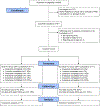Comparative feasibility and preliminary efficacy of CBT for insomnia among adults seeking and not seeking addiction treatment
- PMID: 37423902
- PMCID: PMC11154863
- DOI: 10.1111/jsr.13969
Comparative feasibility and preliminary efficacy of CBT for insomnia among adults seeking and not seeking addiction treatment
Abstract
Two out of three adults seeking treatment for alcohol or other substance use disorders report co-occurring symptoms of insomnia. This study compared the feasibility, acceptability, and preliminary efficacy of cognitive behavioural therapy for insomnia (CBT-I) among adults seeking and not seeking treatment for substance use. Adults with alcohol or other substance use disorders (n = 22, 32% female, 82% White; Mage = 39.5) completed assessments at baseline, post-treatment, and at 6 week follow-up. Of those, 11 were and 11 were not enrolled in substance use treatment. All received CBT-I. Multiple imputation was used for missing data. Data were analysed using repeated measures analyses of variance. In the substance use treatment group, 6/11 completed post and 5/11 completed follow-up. In the non-treatment group, 9/11 completed post and 7/11 completed follow-up. Participants in both groups reported improvements in insomnia severity, sleep onset latency, and dysfunctional beliefs about sleep, with most effects evident at post and follow-up. There was a marginal group-by-time interaction in the change in frequency of substance use, with only participants not in substance use treatment reporting decreases at follow-up. Participants in substance use treatment reported significant reductions in substance-related problems and symptoms of post-traumatic stress disorder over time; however, they also reported more symptoms at baseline. CBT-I produces similar reductions in insomnia but is relatively less feasible among individuals in (versus not in) treatment for substance use disorder. This may be due to the more complex logistics of accessing CBT-I among those in treatment. We speculate that integrating CBT-I into treatment for addictions may improve feasibility in this population. clinicaltrials.gov NCT04198311.
Keywords: alcohol; intervention; mechanism; sleep; substance use disorder.
© 2023 European Sleep Research Society.
Similar articles
-
Psychological therapies for post-traumatic stress disorder and comorbid substance use disorder.Cochrane Database Syst Rev. 2016 Apr 4;4(4):CD010204. doi: 10.1002/14651858.CD010204.pub2. Cochrane Database Syst Rev. 2016. PMID: 27040448 Free PMC article.
-
Therapist-supported Internet cognitive behavioural therapy for anxiety disorders in adults.Cochrane Database Syst Rev. 2016 Mar 12;3(3):CD011565. doi: 10.1002/14651858.CD011565.pub2. Cochrane Database Syst Rev. 2016. PMID: 26968204 Free PMC article.
-
Development of a Voice-Activated Virtual Assistant to Improve Insomnia Among Young Adult Cancer Survivors: Mixed Methods Feasibility and Acceptability Study.JMIR Form Res. 2025 Mar 10;9:e64869. doi: 10.2196/64869. JMIR Form Res. 2025. PMID: 40063947 Free PMC article. Clinical Trial.
-
Psychosocial interventions for cannabis use disorder.Cochrane Database Syst Rev. 2016 May 5;2016(5):CD005336. doi: 10.1002/14651858.CD005336.pub4. Cochrane Database Syst Rev. 2016. PMID: 27149547 Free PMC article.
-
Therapist-supported Internet cognitive behavioural therapy for anxiety disorders in adults.Cochrane Database Syst Rev. 2015 Mar 5;(3):CD011565. doi: 10.1002/14651858.CD011565. Cochrane Database Syst Rev. 2015. Update in: Cochrane Database Syst Rev. 2016 Mar 12;3:CD011565. doi: 10.1002/14651858.CD011565.pub2. PMID: 25742186 Updated.
Cited by
-
Sleep and Substance Use: Exploring Reciprocal Impacts and Therapeutic Approaches.Curr Psychiatry Rep. 2025 Apr;27(4):199-205. doi: 10.1007/s11920-025-01591-y. Epub 2025 Feb 25. Curr Psychiatry Rep. 2025. PMID: 39998806 Review.
-
A Randomized Controlled Trial of Cognitive Behavioral Therapy for Insomnia During Early Recovery from Alcohol Use Disorder Among Veterans.medRxiv [Preprint]. 2025 Jan 5:2025.01.03.25319973. doi: 10.1101/2025.01.03.25319973. medRxiv. 2025. PMID: 39802757 Free PMC article. Preprint.
-
A Preliminary Report on the Effects of Daridorexant in Patients with Comorbid Insomnia and Substance Use Disorders.Pharmaceuticals (Basel). 2025 Mar 6;18(3):378. doi: 10.3390/ph18030378. Pharmaceuticals (Basel). 2025. PMID: 40143154 Free PMC article.
References
-
- APA. (2013). Diagnostic and Statistical Manual of Mental Disorders, Fifth Edition. American Psychiatric Association.
-
- Boness CL, Hershenberg R, Kaye J, Mackintosh M, Grasso DJ, Noser A, & Raffa SD (2020). An evaluation of cognitive behavioral therapy for insomnia: A systematic review and application of Tolin’s criteria for empirically supported treatments. Clinical Psychology Science and Practice, 27, 1–15. 10.1111/cpsp.12348 - DOI - PMC - PubMed
Publication types
MeSH terms
Associated data
Grants and funding
LinkOut - more resources
Full Text Sources
Medical


